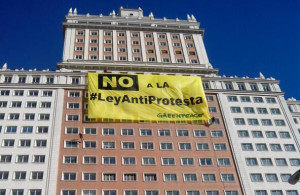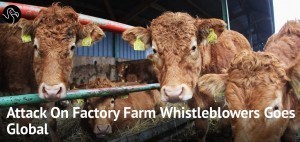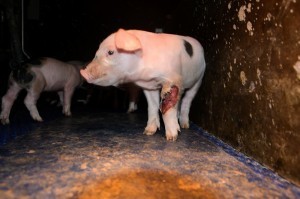Will Potter's Blog, page 13
February 28, 2014
BREAKING: Idaho Governor Signs Ag-Gag Law Making It Illegal to Expose Animal Cruelty
 Idaho’s governor has signed a bill into law that makes it illegal for undercover investigators and whistleblowers to expose animal cruelty on factory farms and slaughterhouses.
Idaho’s governor has signed a bill into law that makes it illegal for undercover investigators and whistleblowers to expose animal cruelty on factory farms and slaughterhouses.
The bill, SB1337, was backed by the state’s billion-dollar dairy industry after Mercy For Animals exposed dairy workers beating, kicking, and sexually abusing dairy cows. Under this new law, the whistleblowers who exposed the cruelty face criminal penalties worse than those who committed the abuse.
As I’ve reported previously, the bill is so broad and vague that it puts journalists at risk, and has been opposed by media outlets and journalism groups.
February 25, 2014
Spain’s New Terrorism Law Targets Banner Drops, Facebook, and Protest
 This article was originally published in Spanish by El Huffington Post (Spain).
This article was originally published in Spanish by El Huffington Post (Spain).
The newly approved “Ley de Seguridad Ciudadana” (Public Safety Act) may include provisions about drugs and sporting events, but make no mistake: this law is not about protecting the public, it is about criminalizing protest, and restricting your right to speak out.
I recently visited Madrid and Barcelona for the release of the Spanish translation of my book, Green Is the New Red. My work focuses on how political activism is being criminalized. Given my area of work, and living in the United States, it is rare that I am shocked anymore by new “national security” laws or repressive measures. I see them every day.
But the “Ley de Seguridad Ciudadana” represents a dangerous expansion of how the freedom to protest is being silenced.
For example, serious offenses include:
* Climbing a public building as a protest action (such as Greenpeace has done in recent months)
* Jumping into a bullring to protest
*Wearing a hood or anything that hinders law enforcement identification at protests
 All of these are punishable by a fine between 1,001 to 30,000 euros.
All of these are punishable by a fine between 1,001 to 30,000 euros.
Other “minor” offenses include placing a tent in a public space, as the Occupy movement has done, taking photographs of police, or failing to follow a permitted march route. These and other violations are punishable with a fine up to 1,000 euros.
I have extensively documented the mechanisms that have allowed this to take place in the United States, and they are identical to what is happening right now in Spain.
For example, the environmental movement in the United States has been using non-violent civil disobedience to stop the construction of the Keystone XL pipeline. Activists have been blockaded roads and locking themselves to equipment. As a result, they are now facing increased time in jail. In some cases, this is directly at the request of corporations: In one recent instance, I reported about how TransCanada is instructing police how to prosecute protesters.
In another case, a university student named Tim DeChristopher disrupted a government auction where public lands were being sold to corporations. Tim raised his hand to purchase this land, even though he knew he did not have any money. The government auction was later ruled illegal, but Tim was sentenced to two years in prison.
Now in the United States there is a radical expansion of this criminalization. Some states have passed new laws that specifically target protesters who take photographs or video of factory farms and slaughterhouses. Some politicians have called these investigators “terrorists.” Just a few weeks ago, an undercover investigator who exposed animal cruelty at a farm — and the video led to criminal prosecutions — was charged with animal cruelty herself. To say that filming animal cruelty is the same as causing animal cruelty is much like saying this new Spanish law is meant to protect citizens; it would make George Orwell proud.
We are already seeing an expansion of these U.S. tactics to other countries. In Australia, corporations are asking for new laws against photography that are the exact same as the United States.
In Spain, a group of activists affiliated with Igualdad Animal are in the middle of criminal proceedings as well. When they were arrested, they were immediately labeled as “terrorists” and threats to the public safety. The government has vaguely accused them of being associated with the release of mink from fur farms, but this absurd; these political activists are being targeted because they have been incredible effective at protesting powerful industries and exposing to the public what is happening.
Regardless of how you feel about animal rights, these activists deserve your full support. What I have witnessed firsthand in the United States is that when people are singled out for persecution because of their political beliefs, the government never stops with them. It expands to other social movements as well, and puts all of our freedoms at risk. This is precisely what we are witnessing with the Ley de Seguridad Ciudadana. 
You may be saying to yourself, “Well I do not climb public buildings, and I don’t even go to protests. Why should I be concerned?”
The biggest danger of this legislation is not that everyone protesting will end up in prison, or facing fines. The real danger is what in the United States we call a “chilling effect.”
This law does not outlaw all protect, but it “chills” it. It makes people afraid of speaking up and protesting. It makes people wonder if they will face arrest or fines for their actions.
Most importantly, laws like this are about fear. They are meant to make us afraid to use our rights.
For many years in the United States, this repression caused widespread fear. But now that is changing. People are outraged about these attacks on democracy, and more people are becoming active. I hope this repressive law in Spain has the same results — instead of instilling fear, it should inspire anger and motivate the public to defend their freedoms.
February 20, 2014
URGENT: Idaho “Ag-Gag” Law Would Make It Illegal to Photograph Factory Farm Cruelty
The dairy industry in Idaho is trying to push through new legislation that would make it illegal to photograph animal cruelty on their factory farms, and its sponsors are saying undercover investigations by animal welfare groups are terrorism.
The “ag-gag” bill is a direct response to an undercover investigation by the animal protection group Mercy For Animals at Bettencourt Dairies, Idaho’s largest dairy farm. The 2012 investigation revealed workers viciously beating and kicking cows, and led to criminal charges.
This week the group released additional footage to the public that also shows workers sexually abusing the cows.
The bill, SB 1337, includes a statement of purpose that it is “to protect agricultural production facilities from interference by wrongful conduct.” But the “wrongful conduct” isn’t this violence and sexual abuse at dairy farms — it’s exposing it.
The bill makes it a crime of “interference with agriculture production” to make “audio or video recordings of the conduct of an agricultural production facility’s operations.”
Even making a false statement on a job application to a factory farm could lead to prosecution.
It also puts journalists at risk with language targeting anyone who “obtains records of an agricultural production facility by force, threat, misrepresentation or trespass” (the latter two could easily wrap-up reporters).
For instance, the Boise Weekly conducted an award-winning investigation of Idaho dairies in 2011. But, the reporters say, “If a new law being pushed by the Republican majority of the Idaho Senate had been in effect then, we would have faced up to a year behind bars and fines of up to $5,000.”
The journalists would also have to pay twice the value of damages to the agricultural facility that their investigation caused.
Ag-gag laws have been opposed by a diverse coalition of organizations including Amnesty International, Human Rights Watch, ACLU, Sierra Club, AFL-CIO, ASPCA, and many more.
To supporters of the legislation—including Idaho’s $2.5 billion milk industry—these exposés are “terrorism.”
During a hearing before the Idaho Senate last Friday, Senator Steve Blair said: “I learned a new term when doing this research. It’s called agro-terrorism… A lot of it happened very recently.”
Blair read from the Animal Enterprise Terrorism Act. But what he didn’t mention is that this term he learned, and its counterpart “eco-terrorism,” were made up by the industry itself. [For a detailed history of this, see Green Is the New Red: An Insider's Account of a Social Movement Under Siege.]
The bill’s sponsor, Senator Jim Patrick, compared investigators to “marauding invaders” and went so far as to compare the targets of ag-gag laws to Al Qaeda.
Perhaps most disturbingly, Patrick indicated that even if this ag-gag bill passes, its supporters won’t be satisfied.
“…this doesn’t go far enough, this law,” he said. “I wish it would go further.”
Take Action: Call Idaho Governor Butch Otter at (208) 334-2100, or email him here. Sign the Change.org petition.
February 19, 2014
Upcoming Speaking Events in DC, Seattle, Olympia, and Eugene
 Hitting the road again for a string of speaking events leading up to the TED conference. If ya’ll know anyone that would be interested, please share! Thank you!
Hitting the road again for a string of speaking events leading up to the TED conference. If ya’ll know anyone that would be interested, please share! Thank you!
University of the District of Columbia School of Law
Washington, DC
Will Potter, Author Discussion- “The Criminalization of Activism”
February 20, 2014
See the Facebook event page for more.
Evergreen State College
Olympia, WA
“From Activist to Terrorist” with Will Potter and Jake Conroy
February 27, 2014
See the Facebook event page for more.
University of Washington
Seattle, WA
“What’s Behind The War on ‘Eco-Terrorism’?: A Talk by Will Potter and Jake Conroy”
February 28, 2014
See the Facebook event page for more.
Public Interest Environmental Law Conference
Eugene, OR
“Opening the Barn Doors of Information – Tearing Down Industrial Ag’s Walls of Secrecy”
Federal and state agencies and the animal Ag industry are attempting to construct and legalize walls of secrecy around environmental and animal welfare practices. These efforts inexcusably threaten our First Amendment rights, usurp the public’s right-to-know, compromise public health, and offend our ethical values. Panelists will discuss litigation challenging, “Ag Gag” laws, failures to meet FOIA disclosure obligations, and restrictions on government’s gathering and public disclosure of information. CLE credit may be available.
February 29, 2014
See the Facebook event page for more.
Would you like to book a speaking event? Find out more…
February 18, 2014
Attack On Factory Farm Whistleblowers Goes Global
 My new article for The Dodo:
My new article for The Dodo:
The man is dressed in all black with a ski mask covering his face. He’s shining a flashlight and his other hand is grasping a fence, as if he’s about to break through. The menacing imagery on the flier, along with bright yellow banners and an abundance of exclamation points, looks like it could be part of a Homeland Security campaign.
But this is part of a different type of campaign by the farmer’s association in Austria. The threat? Animal welfare activists who have published photographs and video of factory farms.
“Radical animal rights activists invade stables. Radical animal rights activists photograph frightened animals,” the flier warns. “Radical animal rights activists terrorize our families…We protect our children and our women!”

For the past few years in the United States, the agriculture industry has tried to make it illegal to photograph or videotape animal abuse on factory farms and slaughterhouses. These “ag-gag”bills are a direct response to undercover investigations by groups like the Humane Society and Mercy for Animals. Their shocking video footage, obtained by workers with hidden cameras, has shown workers beating turkeys with metal pipes and slamming piglets onto concrete floors, among other abuses; the
investigations have also led to the largest meat recall in U.S. history, criminal charges, and ballot initiatives in multiple states calling for reform.
The proposals have become law in Iowa, Utah and Missouri, and more states will consider them this year. Now, other countries are following the lead of U.S. groups, and introducing their own attempts to silence factory farm whistleblowers.
The Austrian ad campaign, for instance, singles out animal activist Martin Balluch and his group VGT, the Association Against Animal Factories. Balluch has criticized the Austrian People’s Party for fighting animal welfare legislation, and he says it’s because 26 percent of the party has ties to the ag industry (much like in the United States, where the sponsors of “ag-gag” bills have close ties to the industry as well). To prove the point, VGT published photographs taken at farms owned by those politicians.
That didn’t sit well with the Austrian Farmers’ Association or the ÖVP, who hit back with the ad campaign and claims of “farm families terrorized.” Balluch says it’s “A number of pure fantasy and false statements to distract from the legitimate allegations” of abuse.
Austria is not alone.
These types of investigations are being classified as “terrorism” throughout Europe. EUROPOL publishes a report on terrorism threats, which is meant as a warning for law enforcement agencies. The report includes the 2005 bombing of the London subway, for example, and the 2004 bombing of the Madrid train system. The report also includes a section on animal rights activists, and a warning about activists with cameras.
“ARE [animal rights extremists] activists also use disinformation methods in order to discredit their targets and weaken their public acceptance,” the report says. “Images of sick and abused animals are embedded in video footage and made public.”
In Finland, an animal rights group called Oikeutta eläimille (Justice for Animals) did exactly that, and faced harsh penalties. The group published photographs and video footage from 30 pig factory farms. The two-month investigation documented injured and dying pigs, and led to a national outcry by the public and members of parliament.
documented injured and dying pigs, and led to a national outcry by the public and members of parliament.
Instead of prosecuting those responsible for the animal abuse, law enforcement went after the whistleblowers. “When we decided to talk openly about the filming, we knew that we could be charged,” says Saila Kivelä. Among the charges she and Karry Hedberg faced was “aggravated defamation.” The pig industry called for prison sentences. But as Kivela told a Finnish media outlet: “How can you defame somebody by showing something that is true?”
Earlier this year, an appellate court agreed and some of the charges against the group were dropped. One activist was given a suspended jail sentence of 20 days and ordered to pay the pig farmers’ legal fees. The more lasting impact, activists fear, is that the prosecution is meant to intimidate other investigators and whistleblowers.
In Australia, the agriculture industry has been closely following ag-gag, and wants its own copycat version. The Victoria Farmer’s Federation says existing laws haven’t been able to stop activists from covertly filming farms, and sometimes rescuing animals in need of medical treatment. Katrina Hodgkinson, the New South Wales Primary Industries Minister, said those filmmakers are “akin to terrorists.” The pig industry has paid for television ads that say animal activists with cameras “terrorise pigs at night.”
Farmers are even offering a $10,000 (AUS) reward to anyone who can help convict an animal activist.
Since April, a Western Australian Senator named Chris Back has been formulating ag-gag legislation to stop websites like AussiePigs.com that publicize undercover footage. And with the Liberal-National Party Coalition winning by a landslide in September, animal advocates fear that the legislation could become a reality.
“We are concerned about the possibility of these laws being introduced into Australia but we are not, in any way, deterred from continuing what we know to be very important work,” says Patty Mark of Animal Liberation Victoria. Mark has been carrying out investigations of factory farms in Australia for 20 years.
“What we witness inside animal agriculture is beyond comprehension,” she told me. “The public would not believe us, if we were not able to bring out the video and photographs of the extreme torture, humiliation, deprivation, terror and pain the animals suffer endlessly in their incarceration… Ag-Gag laws won’t stop us.”
February 7, 2014
TED Interviews Will Potter About Treating Environmentalists as Terrorists
 I’m thrilled to share this lengthy interview I did with the TED team about my journalism. As ya’ll know, I was selected as a TED Fellow, which is just an incredible opportunity. I’ll be speaking at the 30th anniversary TED conference coming up in Vancouver. Until then, I hope you’ll check out this interview, and pass it around. Working with TED is an wonderful chance to share the work I’m doing with a much wider, new audience. Thank you!
I’m thrilled to share this lengthy interview I did with the TED team about my journalism. As ya’ll know, I was selected as a TED Fellow, which is just an incredible opportunity. I’ll be speaking at the 30th anniversary TED conference coming up in Vancouver. Until then, I hope you’ll check out this interview, and pass it around. Working with TED is an wonderful chance to share the work I’m doing with a much wider, new audience. Thank you!
Here’s an excerpt from TED.com:
Is it ever difficult to draw the line between being on the side of the activists and being distanced enough to cover them? At what point do you just think: “OK, forget the journalism thing. I’m getting in there and throwing rocks?”
It is a really difficult line to walk, and one that I’ve struggled with for a really long time, especially in working on the book. But I think I came to the realization that what’s most important is not to pretend that those relationships and friendships don’t exist, but to be up front about it. I think my primary obligation as a journalist is to my readers, and to people who are seeing my work, that I have transparency. I don’t pretend to be unbiased, but by acknowledging my biases — and acknowledging those relationships — I think it makes my reporting a lot stronger because people understand my approach and the context in which I’m saying things.
But you know, in terms of where to draw that line, and whether you should just put down the pen and pad and start being involved in these movements — frankly, the reason I do this work is because I saw all of this happening, and I didn’t know what else to do. I’ve never been a great organizer for protests and things, and I’ve never been that inclined to lobby elected officials. I mean, I’m a writer, and I speak, and I do media. I thought that was the way for me to contribute, to have a role. I think even given the opportunity, I would still stay on this path, because I think that’s what my skills are more useful for. I think that the challenge is everyone finding out what that is for them.
Read the full interview at TED.
February 6, 2014
How to Resist A Grand Jury — Jerry Koch “Promises Continued and Endless Contempt”
 Jerry Koch spent 8 months in jail in New York City for refusing to testify before a federal grand jury. But a district court judge has ruled that imprisonment only strengthened the anarchist’s resolve, and the court had no choice but to release him.
Jerry Koch spent 8 months in jail in New York City for refusing to testify before a federal grand jury. But a district court judge has ruled that imprisonment only strengthened the anarchist’s resolve, and the court had no choice but to release him.
As I reported previously for VICE, Koch, 24, was subpoenaed before a grand jury investigating the 2008 explosion outside a military recruitment center in Times Square. The blast damaged only the front door of the center and injured no one, but the FBI began a “terrorism” investigation of local anarchists.
Koch isn’t accused of this crime—or any other crime. Prosecutors told his lawyers that they think he was at a bar in 2008 or 2009, after the bombing, and that someone else at the bar knew about another person who was involved. Koch was subpoenaed to a grand jury in 2009—when he was only 19—and publicly stated that he didn’t know anything about it and wouldn’t cooperate.
On May 21, he appeared before the grand jury again. And again, he refused to testify.
Grand juries are secretive proceedings that have historically been used to investigate, harass, and disrupt radical social movements. If you refuse to testify about your political beliefs, or others, you can be imprisoned for the duration of the grand jury.
The purpose of this imprisonment, under the law, is to “coerce” the prisoner into testifying. Koch’s attorney, Moira Meltzer-Cohen, submitted what’s known as a Grumbles motion that argued he would not, under any circumstances, cooperate.

It was a lengthy back-and-forth, but eventually judge John F. Keenan of Federal District Court in Manhattan agreed.
In a ruling full of snarky and petty insults against Koch and other anarchists, Keenan concedes that, “…Koch has chosen to remain in contempt — indeed, he promises continued and endless contempt.”
Keenan notes Koch’s deteriorating physical and mental health, and flippantly says that “…Koch will only derive increasing grim self-satisfaction from his position. The more unstable he gets, the more he will be presented as a martyr and perceive himself as such. Koch has already decided that this type of notoriety is more valuable than his health and freedom…”
Keenan was most swayed by 17 letters of support from family, friends, and academics about Koch’s beliefs, and also his public statements about his intentions (as an aside, it was wonderful to hear that the VICE article was included in this).
At one point, Koch was on 24-hour solitary lockdown in the SHU. He was not allowed to shower, or given any reading material. He was never told why he received such harsh treatment, but his transfer to the SHU coincided with a protest by his supporters, and staff at MCC confirmed that to him personally. A staff psychologist at the jail told Koch, “They are treating you like an inmate of 10 South [the Terrorism Unit].”

None of this swayed Koch, though.
In a declaration to the court, filed last year, Koch said:
“I want so badly to spend Christmas with my mother, in a place where I can move freely and sleep in peace. But the idea that I hold the keys to my cell is hollow. I know that cooperating with the Grand Jury will only increase my suffering. It will disappoint and alienate my community. It will undermine everything I believe in, and all I have sacrificed for.”
Similar statements were made by anarchists in the Pacific Northwest, who were also jailed for refusing to testify before a grand jury. Eventually they were released, and the judge cited the “strength of their convictions.”
Koch said in a statement that “I’ve lost more during my incarceration that I ever thought possible.” But he refused to be swayed by fear and intimidation; as Judge Keenan was forced to acknowledge, “Koch is governed by different incentives.”
February 5, 2014
Australia: Will Potter to Speak as International Keynote for One Planet Event
 “One Planet” is a national discussion that will take place in Australia next week, examining the environmental crisis and how we respond to it. Events are being hosted simultaneously in open air cinemas in Sydney, Melbourne, and Brisbane. I’m excited that I was invited to speak (remotely, via Skype), and I’m really looking forward to it.
“One Planet” is a national discussion that will take place in Australia next week, examining the environmental crisis and how we respond to it. Events are being hosted simultaneously in open air cinemas in Sydney, Melbourne, and Brisbane. I’m excited that I was invited to speak (remotely, via Skype), and I’m really looking forward to it.
Here’s a bit more from the organizers, the Wilderness Society of Australia:
The panel will include some of the most influential change makers in Australia and beyond.
MC: Rod Quantock – iconic Australian comedian
Lyndon Schneiders – National Campaign Director The Wilderness Society
Dr. Stephen Bygrave – CEO Beyond Zero Emissions
Dr. Anne Poelina – Nyikina Traditional Custodian from the Mardoowarra, Lower Fitzroy River in the Kimberley region of Western Australia
Will Potter – International keynote, Independent Journalist and Author of Green is the New Red
Together they will attempt to answer the question: ‘As the acceptance of climate change spreads wider, and technology continues to advance, alternative technologies and positive industrial development are providing Australians with the opportunity to stop just saying ‘no’ to environmental destruction, and to start saying ‘yes’ to positive practice. Are alternative technologies and positive industrial development a reality or just a pipe dream?
To what degree do we still need to be opposing negative industry and government policy, or should we focus our energy on adopting and encouraging positive practice?’
The discussion will be flanked by some fantastic film screenings including shorts showcasing the Kimberley and Tarkine regions of Australia, and a screening of the breathtaking feature ‘Home’ It is FREE to attend the event so why not come along and weigh into this highly important question. If you can’t get along make sure to log on to the website to hear the discussion live online.
Find out all the details, and how you can join: OnePlanet.org.au or the Facebook event page.
February 4, 2014
Environmentalist Sentenced to 5 Years in Prison, and a Book Report on Malcolm Gladwell
 A fugitive Earth Liberation Front activist has been sentenced to five years in prison and, in a bizarre twist, ordered to read Malcolm Gladwell’s latest book.
A fugitive Earth Liberation Front activist has been sentenced to five years in prison and, in a bizarre twist, ordered to read Malcolm Gladwell’s latest book.
Rebecca Rubin was wanted for a decade in connection to crimes by the clandestine ELF, which destroyed against property. Her co-defendants have been sentenced to prison as terrorists, and even housed in a secretive prison facility called a Communications Management Unit. Despite knowing that her sentence would likely be severe, Rubin turned herself in for punishment.
Her heavy sentence should be expected, especially considering that Rubin has—unlike many of her co-defendants—refused to “name names” or cooperate in the investigate of environmental groups in any way.
However, in an especially paternalistic and retributive move, Judge Ann Aiken also ordered Rubin to read Malcolm Gladwell’s latest book David and Goliath: Underdogs, misfits, and the art of battling giants.
The message, of course, is that Rubin needs to learn the right way to social change. And Judge Aiken is the one to teach her.
This isn’t the first time Aiken has used the bench to preach her superficial view of social change. Rubin’s co-defendant, Jonathan Paul, was sentenced to read Three Cups of Tea.
As I wrote in Green Is the New Red, Aiken repeatedly pulled stunts like this, and was frustrated when the defendants didn’t play along.
Here’s an excerpt of when two defendants were sentenced, and they refused to compromise their beliefs:
What upsets friends and family more than anything is when Aiken says Block and Zacher are not well read. “For many of us old people, we read books,” she says. “I wonder if people read. . . .” the last word or two in her thought gets lost in the grumbling, whisper- ing and shifting on the wooden benches. Friends who were unfazed when prosecutors described the arsons nearly become incensed when the judge questions their erudition.
“Really at this moment I don’t understand who you are, what you are, your belief system,” she says. “I don’t think you even really understand what life is about.”
Block and Zacher stare ahead.
“I didn’t hear anyone say they’re sorry,” she says. “I didn’t hear anyone apologize. I didn’t hear anyone say they would work to pay restitution.” Aiken pauses and glares at the defendants. One last chance. One last chance to condemn sabotage and embrace com- pact fluorescent light bulbs. Pregnant pause. “You could have stood up right now and addressed these things, but I noticed no one is moving.”
More silence, as tense as the seconds of quiet delay between a lightning flash and the thunderclap.
These “eco-terrorism” sentences aren’t just about punishment, they are about sending a message to the broader environmental movement. The defendants have been expected to not only apologize for their crimes, but apologize for their entire belief system. Apparently, they need to replace it with the sanitized moralizing of pop best-sellers.
So, as Natasha Lennard noted at Salon: “One hopes that Rubin’s supporters send her ample countervailing reading supplies, too.”
Her current mailing address is:
Rebecca Rubin #770288
MCIJ
11540 NE Inverness Dr.
Portland, OR 97220
February 3, 2014
Today, I’m Speaking Out Against the AETA #AETAspeakout
 Today the Center for Constitutional Rights is challenging the Animal Enterprise Terrorism Act in court, arguing that the vague and overly broad law is a violation of the First Amendment.
Today the Center for Constitutional Rights is challenging the Animal Enterprise Terrorism Act in court, arguing that the vague and overly broad law is a violation of the First Amendment.
[As background: "Court Dismisses Animal Enterprise Terrorism Act Lawsuit. Here’s How That Affects You."]
As CCR’s Senior Staff Attorney Rachel Meeropol argues Blum v. Holder before the First Circuit Court of Appeals, activists are packing the courtroom in support. For those who can’t be there, you can share this new video by the plaintiffs, and use the hashtag #AETAspeakout to raise awareness of this dangerous legislation.
This is a law so broad the the FBI has considered using it against undercover investigators. And the first prosecution was for activists who protested and used sidewalk chalk.
Meeropol has an excellent piece on the Huffington Post about the case, “Activists are fighting to speak. Are you willing to listen?”
Today, I am in court in Boston, urging the First Circuit Court of Appeals to strike down the federal Animal Enterprise Terrorism Act (AETA) as a violation of the First Amendment. This law has cast a chill throughout the animal rights community, targeting peaceful picketing, boycotts, and nonviolent civil disobedience as “terrorism.” As with similar repression throughout history, the AETA targets an unpopular group of activists and protects politically powerful interests from protest. It is a dangerous, unconstitutional law that will go down as a shameful mark on our history…
Make no mistake, neither the AETA nor ag-gag laws are aimed at protecting businesses from illegal radical activism–existing law already punishes vandalism, harassment, and fraud. Rather, these laws aim to protect animal industries from radical ideas. Animal rights activists want to fundamentally change the way we view animals: to get us to see animals not as food, textiles, test tubes, or performers, but as individuals with lives worth living.
Here’s a full list of articles and resources on the AETA. Speak up today!





